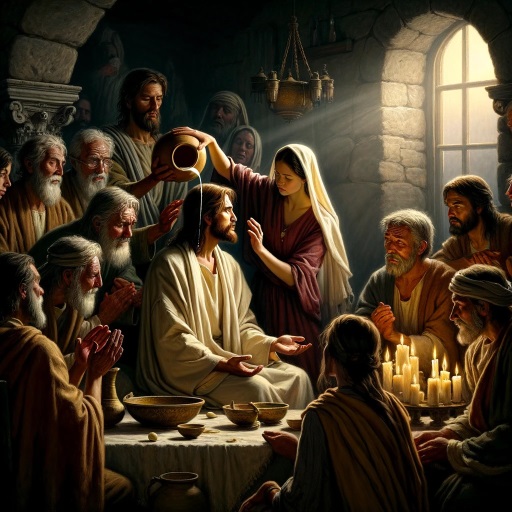
The Anointing
ChatGPT-4/DALL-E3, 2024-03-21
My dear friends,
In the quietude of Bethany, a profound lesson unfolded—a lesson of devotion, perception, and the essence of giving. This narrative invites us into a contemplative journey, exploring the layers of spiritual symbolism and the profound implications for our own path.
in the house of Simon the leper,
as he sat at the table,...
- Mark 14:3
The setting in Bethany, in the house of Simon the leper, underlines a theme of healing and acceptance. Jesus, the healer and spiritual master, is among those marginalized by society, teaching us the importance of compassion and inclusivity on our spiritual journey.
and she broke open the jar and poured the ointment on his head.
- Mark 14:3
This act of anointing by the woman is a profound expression of devotion and foresight. The costly ointment, used without reservation, symbolizes the depth of her faith and the all-encompassing nature of true spiritual offering—where material value pales in comparison to the value of spiritual devotion.
"Why was the ointment wasted in this way?
For this ointment could have been sold for more than three hundred denarii,
and the money given to the poor."
And they scolded her.
- Mark 14:4-5
The indignation expressed by some witnesses highlights a common spiritual pitfall: failing to recognize the value of heartfelt actions over material considerations. It serves as a caution against judging the expressions of others' faith and encourages us to seek deeper understanding and empathy in our interactions.
She has performed a good service for me.
For you always have the poor with you,
and you can show kindness to them whenever you wish;
but you will not always have me."
- Mark 14:6-7
Jesus' response underscores the impermanence of physical presence and the timeless value of spiritual recognition and action. His words remind us of the importance of seizing the moment to express our devotion and understanding, teaching us the balance between temporal responsibilities and eternal spiritual truths.
- Mark 14:8
In acknowledging the woman's act, Jesus highlights the deep insight and acceptance of his impending sacrifice. This moment teaches us about the profundity of understanding the spiritual significance of our actions and their impact beyond the immediate context.
wherever the good news is proclaimed in the whole world,
what she has done will be told in remembrance of her."
- Mark 14:9
The proclamation by Jesus ensures the eternal remembrance of the woman's act, symbolizing the everlasting impact of genuine spiritual deeds. This reinforces the teaching that true acts of devotion and insight transcend time and are remembered and honored in the continuum of spiritual practice.
Through this narrative, we are invited to reflect on the depth of our own spiritual practices, the sincerity of our devotion, and the openness of our hearts to understand and embrace the true essence of spiritual giving. May we carry these lessons forward in our journey towards enlightenment.
Nard
The fact that nard, the ointment used to anoint Jesus, comes from the Himalayas adds layers of spiritual and symbolic depth to this poignant narrative. Nard, or spikenard, is a costly and highly valued perfume, extracted from the roots of Nardostachys jatamansi, a plant that grows in the remote alpine regions of the Himalayas. This geographical detail not only underscores the ointment's significant material value but also weaves in the interconnectedness of distant cultures and the widespread reach of spiritual symbols.
In Tibetan Buddhism, the Himalayas hold profound spiritual significance, often considered a natural sanctuary for meditation and the pursuit of enlightenment. The use of an ointment from such a spiritually charged region in the anointing of Jesus adds an element of universal spirituality, bridging cultural and geographical divides. It highlights the interconnectedness of all spiritual traditions and the universal quest for divine connection and understanding.
That Jesus would carry the scent of this Himalayan perfume through his suffering, death, and entombment is deeply symbolic. The fragrance of nard, associated with nobility and sanctity, becomes a marker of Jesus' sacred mission and his enduring spiritual presence. It serves as a sensory reminder of his teachings, his sacrifice, and the profound love he embodies. The aroma of nard, lingering on Jesus, symbolizes the permeation of his spiritual essence and teachings through the darkest and most challenging moments of human existence—suffering and death.
Furthermore, the scent of nard, transcending the physical boundaries of geography and culture, becomes a metaphor for the eternal nature of spiritual truths. Just as the fragrance lingers beyond the act of anointing, so too do the teachings and divine presence of Jesus transcend the boundaries of time, place, and physical existence. This acts as a comforting reminder that spiritual guidance and the essence of divine love are always accessible, even in moments of great trial and beyond the threshold of death.
In essence, the use of nard from the Himalayas and its enduring scent through Jesus' most challenging moments serves as a powerful symbol of the universality of spiritual journey, the interconnectedness of all paths to the divine, and the everlasting nature of love and spiritual enlightenment. This deepens the narrative’s impact, inviting followers to find common ground across spiritual traditions and to recognize the shared humanity and divine spark within all.